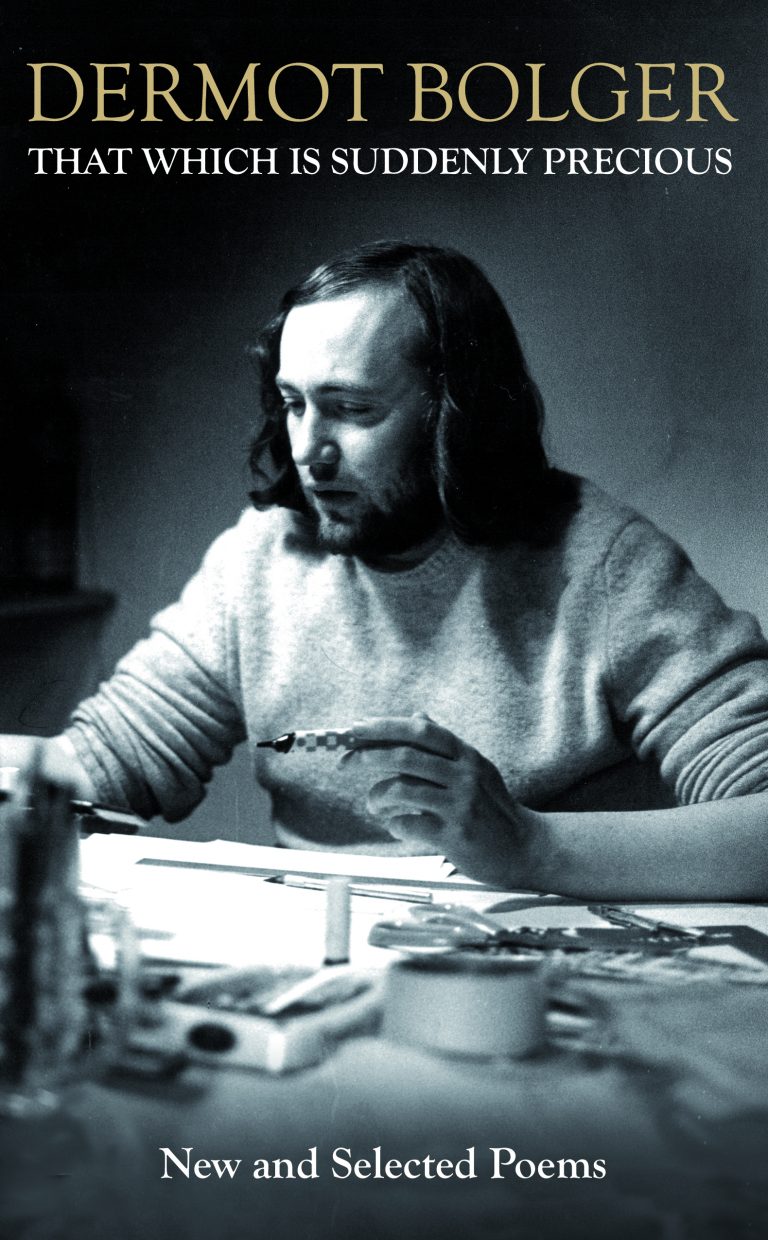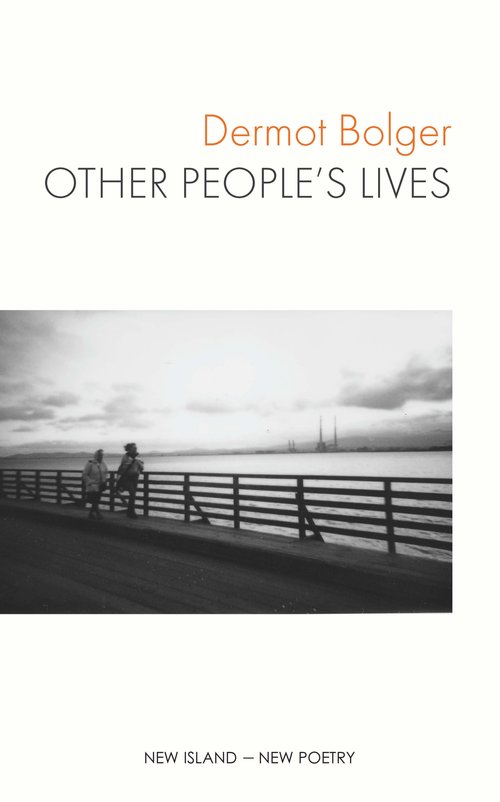
The Poetry of Dermot Bolger

Early Collections
Although best known as a novelist and playwright, Dermot Bolger has always been first and foremost a poet, going back to his teenage years when he published broadsheets by local poets and ran poetry sessions at home while his sailor father was at sea. He is the author of ten collections of poetry, most long out print, including The Habit of Flesh (1980), Internal Exiles (1986), Leinster Street Ghosts (1989) and Taking My Letters Back (1998).
His central sequence of his 2008 collection, External Affairs, harked back to his early days as an encourager of emerging voices in that the sequence was published in two contrasting ways. The poems tried to imagine the thoughts of commuters in a succession of snapshots amid the rush of busy lives. Bolger’s finished poems then became the pages of a public book, left open as murals on gable ends or at tram stops, or being printed as posters for local libraries and public buildings or displayed as words and video images projected onto night-time pavement in South Dublin County. Each poem ended with an invitation for local poets to join this imaginative journey by sending their own poems in response. These were edited into an anthology, entitled Night & Day, where Bolger paired each of his poems with one by a local writer. In this way the original audience for his poster poems became the co-authors of the resultant anthology. Bolger’s original sequence was then printed in External Affairs, alongside his Ballymun Incantation – a poem written to be recited by local people at a public wake to mark the demolition of the first Ballymun tower block. The book also contained The Frost is All Over sequence, which explores the relationship between traditional musicians and the tunes they play and recounted the often forgotten lives of a generation of custodians of that music.
The Venice Suite
Four years later he published The Venice Suite, a deeply personal sequence of poems which “no writer would ever wish to write’. Charting his experience of sudden bereavement, it explored the stages of loss in an irrevocably altered world, where one partner is left behind to deal with the ongoing business of living while trying to comprehend the enormity of the severance of a shared life suddenly rendered into the past tense. Richly tender love poems which try to map the unknown new territory in which any bereaved person finds themselves, the Times Literary Supplement noted that ‘“In the numbness of grief I felt certain I would never write poems again,” Bolger claims in his prefatory note. But his readers will be glad that he has done so… in what is ultimately a book of celebration… unflinching and sad – and beautiful.’ Thomas McCarthy in the Irish Examiner remarked that ‘The entire collection works as a marvellous elegy. Grief is called up and colours everything Bolger does with his technical excellence. Heart-breaking.’
That Which is Suddenly Precious & Other People's Lives (2022)
In 2016 he published His New and Selected Poems, That Which is Suddenly Precious, which celebrated his finest poetry written over forty years, from teenage poems to previously unpublished new work. On a public level it charted a poet’s passionate engagement with Irish society. Yet on a private level it was deeply intimate, charting the author’s life in poems described by Paul Durcan as ‘pure poetry. The saddest, truthfullest poetry you can imagine. Poetry at its lyric limits.’
In 2021 Bolger was the recipient of the Lawrence O’Shaughnessy Award for Poetry from The University of St. Thomas in America, allowing him, as he observed, to finally be able to use the words “poetry” and “money” in the same sentence, forty-seven years after writing his first poem.
Other People’s Lives (2022)
Dermot Bolger’s latest collection of poems, Other People’s Lives, was published in April 2022. Every night during a year spent in lockdown, Bolger set out on long walks through deserted streets through Dublin, armed only with a pen and paper. Bolger follows in the footsteps of the great
Portuguese poet, Fernando Pessoa, using walks through his native city to allow his imagination free rein to revisit pivotal moments in his own life and speculatively meditate on the lives of others in a series of remarkable poems.
The new collection starts with his parents honeymooning in a wartime Wicklow orchard and ends, eight decades later, as the poet dances with his partner in a Wicklow field. In between we encounter Nuala
O’Faolain on a bicycle on Brooklyn Bridge; Grace Gifford Plunkett, defiant in her lonely final years; Herbert Simms, Dublin’s brilliant, tragically overworked housing architect; and Patricia Lynch, writing The Turf-Cutter’s Donkey in one room while her husband wrote communist tracts
in the next.
Interlaced with such real lives are imagined ones – a hardened criminal detailing prison life in haikus, a doppelganger exploring alternative pasts for the author. Taken together, these poems chart a dazzling
constellation of experiences.
Copies can be purchased from good bookshops
or direct from the publishers at https://www.newisland.ie/poetry-drama/other-peoples-lives
See the news section for the review by Nick Cooke of “Other People’s Lives” in the British poetry magazine, The High Window, published on 29th November 2022

Little Xs
A poem by Dermot Bolger
Unexpectedly this October afternoon, the telescope turns,
I see myself, made small again, through its objective lens:
I am not the widower, who recently buried my wife,
Nor the dutiful son who kept vigil while my father,
Like a punch-drunk boxer, fought to out-fox death,
Demented and enraged, hands wrapped in cartoon gloves
To stop him pulling at the tube to his morphine pump.
Today we clear the house where he lived for sixty years.
In the bedroom where I was born, my siblings recall
How, as children, their only clue to my birth occurring
Behind this closed door were anxious instructions to pray.
When we open up the attic we discover the suitcase
My mother packed for her last trip into hospital:
A wash-bag and talc, clothes she never got to wear home,
A purse crammed with prayers and the folded letter
I wrote, as a ten-year-old, for my sister to take into her.
I spend one page telling her I’m being good, then cram
Three pages with scrawled Xs – each one representing a kiss.
Last week, a granddaughter she never knew, sang on stage,
Luminous and radiant, in a band named Little Xs for Eyes.
For four decades in a letter in a purse in a suitcase in this attic
These galaxies of Xs were the banished eyes of a bewildered child.
But – unfolding them – I see myself staring out at who I am now,
Across this life I could never have envisaged when I scrawled
Untidy Xs for a woman I last saw smiling from a hospital bed,
Who sealed them in her purse when nurses shaved her head
In preparation for an operation she would never recover from:
Praying that one day I might open her purse and be surprised
To find my Xs returned to me: big Xs for kisses, little Xs for eyes.
“Little Xs” is taken from both “The Venice Suite” &
“That Which is Suddenly Precious”, published by New Island.